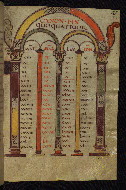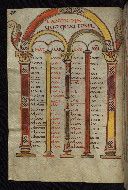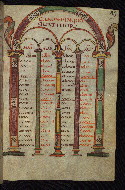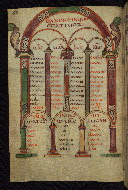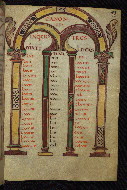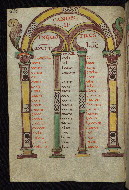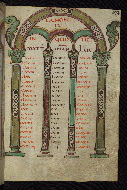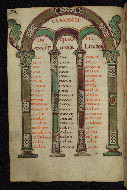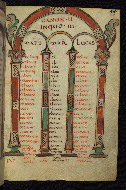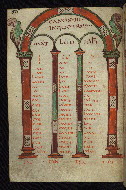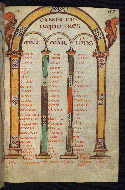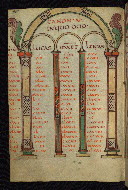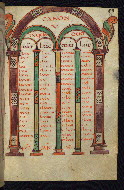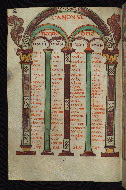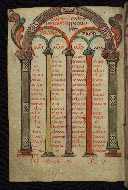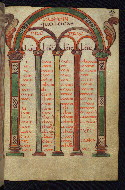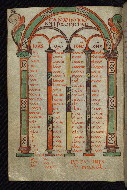Home > Digitized Walters Manuscripts
This document is a tranformation of a TEI P5 XML manuscript description incorporating images. If you have trouble reading special or non-Latin characters on this page, please make sure you have appropriate Unicode fonts installed and an up-to-date web browser.
Walters Ms. W.4, Freising Gospels
Browse images (Browse images in a new window) | TEI in XML format
W.4
Freising Gospels
Authority name: Jerome, Saint, d. 419 or 20
This Gospel Book was written in the diocese of Freising, Germany, ca. 875. Surprisingly small for a Gospel Book, it is nonetheless richly illuminated and offers an excellent example of Carolingian art and Caroline minuscule script. The expressive and emotive quality of the Evangelist portraits, characterized by quick, sketchy brushwork, recalls the style developed by the Carolingian school of Reims in northern France. The canon tables, however, derive from a different tradition, and recall Franco-Saxon imagery in their use of interlace within the columns and of acanthus springing from the top corners. The manuscript is one of a small group of codices produced at Freising at this time, among them another Gospel Book, Munich, Bayerische Staatsbibliothek Clm 6215. It is complete, consisting of 215 folios and includes readings for the liturgical year, Jerome's Plures fuisse and Novum opus letters, decorated canon tables, and Evangelist portraits.
Second half of the 9th century CE
Freising, Germany
Book
Scriptural
The primary language in this manuscript is Latin.
Parchment
Closely cropped; parchment ranges from thin to thick, scrape marks often visible on hair side; thicker parchment on folios with decoration
Foliation: 215
Two sets of numbers present: nineteenth-century black ink pagination in upper corners, modern penciled foliation written just below (followed here)
Formula: 1(8,-1), 2(8), 3(8), 4(10), 5-11(8), 12(10,-10), 11-12(8), 13-14(8), 15-16(6), 17-26(8), 27(10,-10)
Catchwords: None
Signatures: One partially extant mark on fol. 65v: a centered, four-dot diamond in brown ink
Comments: Quires begin on fols. 1(1), 7(2), 17(3), 24(4), 34(5), 42(6), 50(7), 58(8), 66(9), 74(10), 82(11), 90(12), 99(13), 107(14), 115(15), 121(16), 127(17), 135(18), 143(19), 151(20), 159(21), 167(22), 175(23), 183(24), 191(25), 199(26), 207(27)
12.2 cm wide by 17.5 cm high
fols. 1r - 215v: 7.5 cm wide by 12.0 cm high
fols. 24v - 32v: 12.0 cm wide by 15.0 cm high
- Columns: 1
- Ruled lines: 20
- Hard point ruling
- Above measurements for fols. 24v-32v refer to the average height and width of the framing arches of the canon tables; due to cropping, the height is about .5 cm shorter than it would have been originally
- Title: Gospel Book
- Hand note: Written in Caroline minuscule script; headings, opening lines of textual divisions, and running headlines in square and rustic capitals
- Decoration note: Full-page Evangelist portraits, eccentrically placed; canon tables spread over eight folios; enlarged initials at a height of 2 lines throughout in red, orange, black, and blue; headings above Gospel texts done in same colors at a height of 1 line
- Title: List of readings for the liturgical year
- Rubric: Incipiunt capitula lectionum Evangelii anni circuli
- Incipit: In vigilia natalis domini secundum Matheum
- Title: Prologue to the Gospels
- Author: Jerome, Saint, d. 419 or 20
- Rubric: Incipit prologus iiii evangeliorum
- Incipit: Plures fuisse [Stegmüller 596]
- Title: Epistle to Damasus (Novum opus)
- Author: Jerome, Saint, d. 419 or 20
- Rubric: Incipit Epistola Sancti Hieronimi
- Incipit: Beatissimo Papae Damaso Hieronimus novum opus [Stegmüller 595]
- Title: Seventy-four chapter list to the Gospel of Matthew
- Rubric: Incipiunt capitula secundum Mattheum
- Incipit: De generatione Christi
- Title: Canon tables
- Rubric: Canon I in quo quattuor
- Text note: Section comprised of Eusebian canon tables I-X spread over eight folios
- Decoration note: Eusebian numbers divided into columns of three or four by framing arches and columns topped with stylized classical capitals; springing acroteria with stylized acanthus; inner double arch divided into two arches on folios with four written columns, each smaller arch above a set of text columns; areas of yellow, maroon, green, and orange alternating with dark brown sections containing plaited designs; colored braided bands in columns separating chapter numbers; chapter numbers written in alternating black and red
- Title: Gospels
- Contents: Contents: fol. 33r: Incipit prologus secundum Mattheum (Mattheus ex Iudaea sicut in ordine primus ponitur [Stegmüller 590]); fols. 34r-89v: Matthew; fol. 91r-v: Incipit prologus secundum Marcum (Marcus Evangelista Dei electus [Stegmüller 607]); fols. 92r-93r: Incipiunt capitula (De Iohanne et de victu); fols. 93v-125r: Mark; fol. 125v: Incipit argumentum secundum Lucam (Lucas syrus antiochensis, arte medicus [Stegmüller 615]); fols. 127r-130v: Incipiunt capitula secundum Lucam (Zacharias viso angelo); fols. 131r-178r: Luke; fol. 179r-v: Incipit prologus (Iohannes Evangelista unus ex discipulis Dei [Stegmüller 624]); fols. 179v-180r: Incipit elencus brevis Evangelii secundum Iohannem (Phariseorum levitae); fols. 180v-215v: John
- Text note: Ammonian sections marked in margins of text throughout
- Decoration note: Full-page Evangelist portraits: Matthew before his Gospel, fol. 33v; Mark before his prologue, fol. 90v; Luke before his capitula, fol. 126v; John before his prologue, fol. 178v
fol. 24r:
fol. 24v:
fol. 25r:
fol. 25v:
fol. 26r:
fol. 26v:
fol. 27r:
fol. 27v:
fol. 28r:
fol. 28v:
fol. 29r:
fol. 29v:
fol. 30r:
fol. 30v:
fol. 31r:
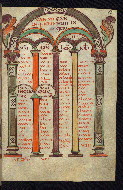
- Title: Canon table
- Form: Full-page miniature
- Text: Eusebian canons VII, VIII, and IX [here written VIIII]
fol. 31v:
fol. 32r:
fol. 32v:
fol. 33v:
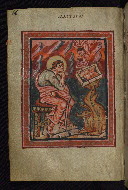
- Title: Portrait of the Evangelist Matthew
- Form: Full-page miniature
- Text: Gospel of Matthew
- Label: The Evangelist Matthew is seated on a cushioned bench, his pen poised to write in a book supported by an elaborate animal-shaped lectern. He looks for inspiration to his symbol, the winged man. Matthew's drapery, which is drawn from the tradition of classical author portraits, cascades around him, lending the figure a sense of nervous energy as he prepares to write, an energy that is echoed in the tumultuous red and orange clouds behind him. This is a late example of the artistic style developed at the Carolingian school of Reims in the 830s and 840s.
fol. 90v:
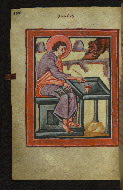
- Title: Portrait of the Evangelist Mark
- Form: Full-page miniature
- Text: Gospel of Mark, facing the prologue
- Label: Mark is depicted seated at a heavy desk, dipping his quill pen in ink as he prepares to continue writing in the book on his lap. His appearance, dressed in drapery and sandals, recalls the classical tradition of author portraits. Mark looks at his symbol, the lion, in the upper right corner.
fol. 126v:
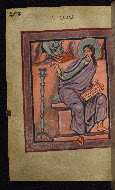
- Title: Portrait of the Evangelist Luke
- Form: Full-page miniature
- Text: Gospel of Luke, facing the capitula
- Label: Luke is clothed in robes and sandals and recalls the tradition of classical author portraits. While he sits on a cushioned bench, he lacks an accompanying desk or lectern, forcing him to balance his book on his left knee. He is somewhat awkwardly posed, for he must reach nearly behind him to dip his quill into his elaborate ink pot. Luke's symbol, the bull, reaches down over his shoulder.
fol. 178v:
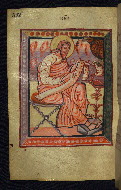
- Title: Portrait of the Evangelist John
- Form: Full-page miniature
- Text: Gospel of John, facing the prologue
- Label: This image of John the Evangelist, clothed in draped robes and sandals, recalls the tradition of classical author portraits. He sits on a folding chair and is actively writing in response to the inspiration he is receiving from his symbol, the eagle. Unlike his fellow Evangelists in this manuscript, John writes on an unfurled scroll that is draped across his lap.
The binding is not original.
German or French nineteenth-century purple velvet over coarsely woven blue canvas over beech boards, with vestiges of old manuscript pastedowns (boards probably sixteenth-century)
Created in Freising, Germany, ca. 865-75
Germany, nineteenth century (judging from the first set of pagination)
Leon Gruel and Robert Engelmann, Paris, late nineteenth-early twentieth century, no. 78
Henry Walters, Baltimore, MD, February 19, 1917
Walters Art Museum, 1931, by Henry Walters bequest
Frere, W. H. Studies in Early Roman Liturgy II: The Roman-Gospel Lectionary. London: Oxford University Press, 1934.
De Ricci, Seymour. Census of Medieval and Renaissance Manuscripts in the United States and Canada. Vol. 1. New York: H. W. Wilson Company, 1935, p. 767, no. 62.
Baltimore Museum of Art. The Greek Tradition in Painting and the Minor Arts: An Exhibition Sponsored Jointly by the Baltimore Museum of Art and the Walters Art Gallery from May 15 through June 25, 1939. Baltimore: Baltimore Museum of Art, 1939.
Walters Art Gallery. Illuminated Books of the Middle Ages and Renaissance: An Exhibition Held at the Baltimore Museum of Art. Baltimore: Trustees of the Walters Art Gallery, 1949.
Walters Art Gallery. 4,000 Years of Modern Art. Baltimore: Walters Art Gallery, 1953.
Diringer, David. The Illuminated Book: Its History and Production. London: Faber and Faber, 1958.
Miner, Dorothy E. "The Development of Medieval Illumination." Catholic Life Annual 1 (1958).
Wright, D. "Review of A. Grabar and C. Nordenfalk, Early Medieval Painting from the Fourth to the Eleventh Century." Art Bulletin 43 (1961): 245-255.
Faye, C. U., and W. H. Bond. Supplement to the Census of Medieval and Renaissance Manuscripts in the United States and Canada. New York: Bibliographical Society of America, 1962.
Wright, D. "The Codex Millenarius and its Model." Münchner Jahrbuch der bildenden Kunst, 3rd series, 15 (1964): 37.
Walters Art Gallery. 2,000 Years of Calligraphy. Totowa, NJ: Rowman and Littlefield, 1965.
Berkowitz, David S. In Remembrance of Creation: Evolution of Art and Scholarship in the Medieval and Renaissance Bible. Waltham, MA: Brandeis University Press, 1968.
Klauser, T. Das romische Capitulare evangeliorum: Texte u. Untersuchen zu s. altesten Geschichte. Vol. I. Munster/Westf.: Aschendorff, 1972.
Mutherich, Florentine. "The Gospel Book W.4 of the Walters Art Gallery and Its Place in the Freising Scriptorium." In Gatherings in Honor of Dorothy E. Miner. Edited by Ursula E. McCracken, Lilian M. C. Randall, and Richard H. Randall Jr. Baltimore: Walters Art Gallery, 1973, pp.115-128.
Nordenfalk, Carl. "A Tenth Century Gospel Book in the Walters Art Gallery." Gatherings in Honor of Dorothy E. Miner. Edited by Ursula E. McCracken, Lilian M. C. Randall, and Richard H. Randall Jr. Baltimore: Walters Art Gallery, 1973.
Randall, Lilian M. C. "Illuminated Manuscripts: Masterpieces in Miniature." The Walters Art Gallery Bulletin and Calendar 37, no. 6 (1984): 1-2.
Clarkson, Christopher. "Rediscovering Parchment: The Nature of the Beast." The Paper Conservator 16 (1992): 5-26.
Burin, Elizabeth. "Mixing Styles on the Pilgrimage Roads: A Romanesque Manuscript in the Walters Art Gallery." Journal of the Walters Art Gallery 54 (1996): 9-20.
Principal cataloger: Walters Art Museum curatorial staff and researchers since 1934
Editors: Herbert, Lynley; Noel, William
Copy editor: Bockrath, Diane
Conservators: Owen, Linda; Quandt, Abigail
Contributors: Bockrath, Diane; Emery, Doug; Hamburger, Jeffrey; Noel, William; Tabritha, Ariel; Toth, Michael B.
The Walters Art Museum
Licensed for use under Creative Commons Attribution-NonCommercial-ShareAlike 3.0 Unported Access Rights, http://creativecommons.org/licenses/by-nc-sa/3.0/legalcode. It is requested that copies of any published articles based on the information in this data set be sent to the curator of manuscripts, The Walters Art Museum, 600 North Charles Street, Baltimore MD 21201.
